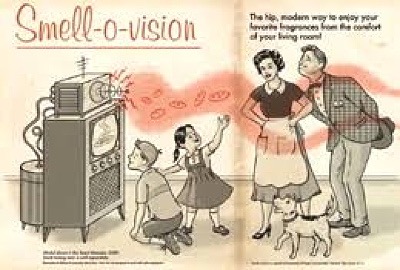Smell0Vision

"When well-produced fantasy becomes the new reality,
what does the viewer become?"
I do not know how deeply television has influenced me. It might be that it's in the nature of TV that no viewer could ever know how deeply it influences them. What I experienced as a passive watching, though, seems to have been a more complicated interaction than I sensed. I know that in my youth, I would have chosen TV over almost any other activity, even if, as was often the case, "nothing was on." I became a fairly indiscriminate consumer, relatively indifferent to the actual content and much more intent upon experiencing that zoned-out state. Before sex, drugs, and rock and roll, TV was there. More importantly, I was eventually, always there for TV.
My folks kept their TV on every waking hour. Mornings brought The Today Show mumbling behind their morning routine. It seemed to be their morning routine. They weren't isolated in a relatively remote small city, but visiting the center of the broadcast universe over coffee every morning. Try to engage in conversation, and my grandmother would ask that I please just wait until her shows were over. I swear that the house could have burned down around her while she sat transfixed over the latest Edge Of Night plot twist, and The Edge Of Night was, as near as I could tell, nothing but endless plot twists. Grandma even bought Soap Opera Digest to supplement her TV Guide. Many of the most influential adult authority figures of my youth seemed much more glued to the tube than influences over me, but maybe they were introducing me to what might well become the dominant reality.
Fortunately, as an adult, I quickly became too poor to even have a television. A few years spent away from the one-eyed zombifier sort of shook its transfixing influence out of my life. I read, went on long walks, and started learning how to cook instead. Later, I even achieved the ennobling state of not having a radio in my car, and was, for a time, truly unplugged. I even missed Rush Limbaugh's emergence. We were singing old Broadway show tunes to each other in the car instead. My first wife and I eventually bought our first TV, a twelve inch black and white model with a protruding antennae, and we thought ourselves reconnected again, though we hardly ever turned on the damned thing. I most fondly remember that tiny television, so small that we could actually tuck in the damned thing next to us in bed where we could really cozy up and watch The Carol Burnett Show on a Saturday night. It was our first child.
I missed the cable revolution. Why pay good money for access to programming so phenomenally poor that nobody should pay good money to watch it? ESPN, MTV, what was that first shopping channel?, each failed to find me as their mark. I adopted a sundown rule where TV was concerned. If the sun was still shining, the TV stayed off, with occasional violations allowed for perhaps a World Series game. There always seemed to be plenty to do other than watch the tube. The Muse and I keep our one TV in an inconvenient place. We tend to watch it during suppertime, me sitting on a chair that needs three pillows to support me, supper balanced on TV trays before us. Much of the time, we cannot find anything really worth watching. Netflix usually comes to our rescue.
I'm not saying that I've completely escaped the hypnotic ray, but I might be in a position to say something useful about its influence on our lives today. I never found "reality TV" to seem terribly real. When I taught professional workshops, I avoided introducing anything like life boat drills—where a group has to vote one of its members out of the group—into the exercises because these don't teach anybody anything other than how to be mean. I tried to watch The Apprentice but only lasted about ten minutes. I switched the channel saying that no business could legally allow any executive to behave like that. Now, we have one of those executives broadcasting live from our White House. An article in the New York Times insists that Trump's election holds a causal thread back into the electorate's television viewing habits, and doubtless watching the boob tube has become a well-ingrained habit for many Americans. I understand the thrall, the growing indifference to what's actually flickering. It's the flickering that counts. It seems to feed some primal need in us, fully satisfying that need and making it ache when it's not being fulfilled, always blaring in the background.
Television, even that much bereaved little black and white, might have become our reality. The homes displayed there sure seem better than ours. The advertised products appear as if they just might finally satisfy us. The cars seem zoomier. The violence less threatening. The romance, so much better than we ever experienced. The teeth seem so brilliant and straight. Where in the Hell do they find so many people with perfect teeth? TV's a fun house mirror with a subtle dark side. What we see is never what any of us ever gets. TV's primary magic seems to be its ability to utterly convince its viewers that it's somehow real. When well-produced fantasy becomes the new reality, what does the viewer become?
©2019 by David A. Schmaltz - all rights reserved


